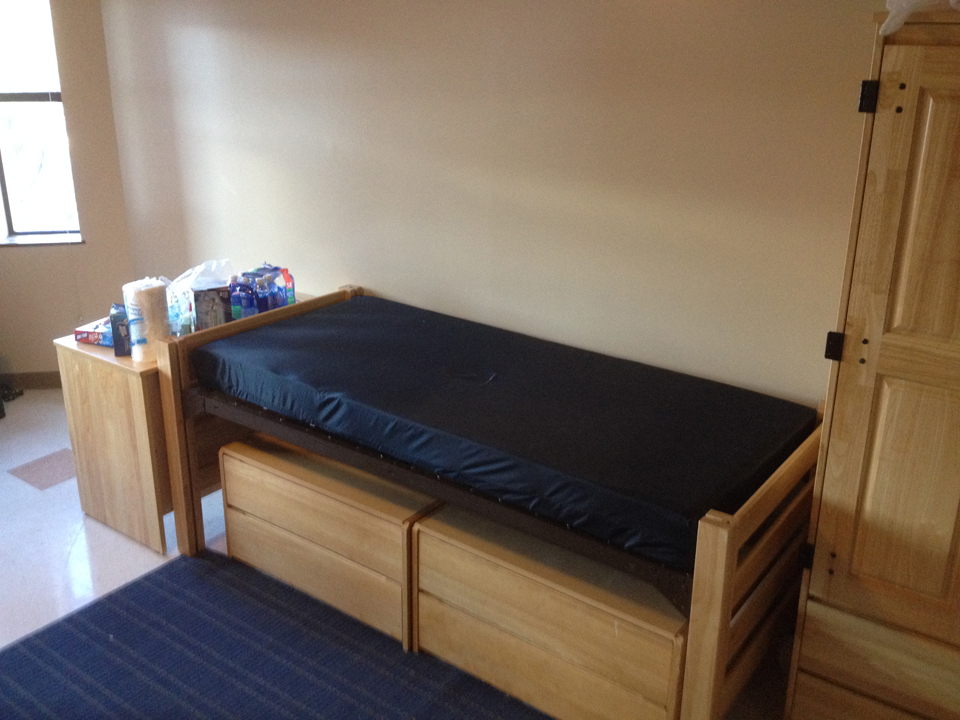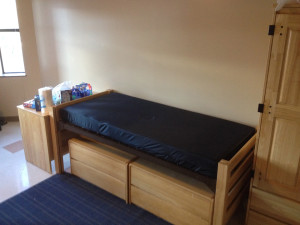

A bed in Vickroy remains empty. Some students have been under pressure to find roommates to fill empty spaces or pay an added fee.
By Brandon Addeo | Asst. News Editor
Find a roommate or pay the price.
That’s what Duquesne has always told students who are occupying double rooms by themselves after their roommates move out.
But the long-standing Duquesne housing policy of “room consolidation” has come under fire this semester as some students struggle to find roommates and avoid rate hikes.
Sophomore secondary education major Marissa Vaul was recently confronted by the policy when Residence Life sent her an email, telling her to find a roommate for her double room or pay an additional $1,600.
Vaul was confused by the email, since she had lived alone in her room without an upcharge during the fall semester, after her roommate backed out of their housing agreement last-minute. Vaul was open to having another student assigned to her room, but had no friends who needed second-semester housing.
Duquesne spokeswoman Bridget Fare said the university offers assistance to students who face this dilemma.
“At Duquesne, students who find themselves without a roommate can find another roommate on their own, within a provided deadline, or the university will assist them in getting another roommate if they do not want to pay for a single,” Fare said.
According to Fare, many students are left trying to fill empty beds after their former roommates transfer schools, move to other dorms or leave for study abroad opportunities.
Residence Life Assistant Director Daniel Cangilla also said the Residence Life staff will work with students to fill room vacancies.
But Vaul said the help she got from Residence Life was not enough.
“All [the Vickroy resident director] did was email me the names and emails of these girls and said, ‘good luck,’” she said.
Vaul and other students brought forth questions about the policy’s purpose, as an increasing number of dorm rooms are becoming vacant as more students move into off-campus housing.
At an Oct. 20 town hall meeting, Duquesne Vice President for Management and Business David Beaupre said there were 304 empty beds for the fall semester — or 8 percent of the total number of dorm rooms.
According to Vaul, there is at least one unoccupied room on her floor, and several others that she has observed in Vickroy.
Cangilla said the room consolidation policy is needed because it “ensures fairness.”
“Students who want a single-occupancy room are given the opportunity to choose and pay for that option,” he said. “Students who do not wish to have a single room can either find a new roommate or work with the Office of Residence Life to be assigned a new roommate.”
Vaul did not believe the policy was fair.
“I understand if there are transfers or study abroad or international students coming in and they need a place to stay,” she said. “But if they don’t have anyone looking for rooms, why bother people?”
She said that the policy can be improved by allowing students more than two weeks to find a new roommate.
“Give [students] a chance to talk to one another, go to Starbucks, get to know one another,” Vaul said. “Don’t give us the one week’s notice — give us a chance to talk to each other, figure out our schedules [and] habits.”
Having more time to learn about a potential roommate could also limit personality clashes following consolidations, she added.
Vaul suggested that the process be simplified by hosting another “find a roommate” event to be held specifically for students whose rooms are being consolidated.
Vaul eventually resolved her situation by finding a student living in Towers who faced a similar dilemma.




